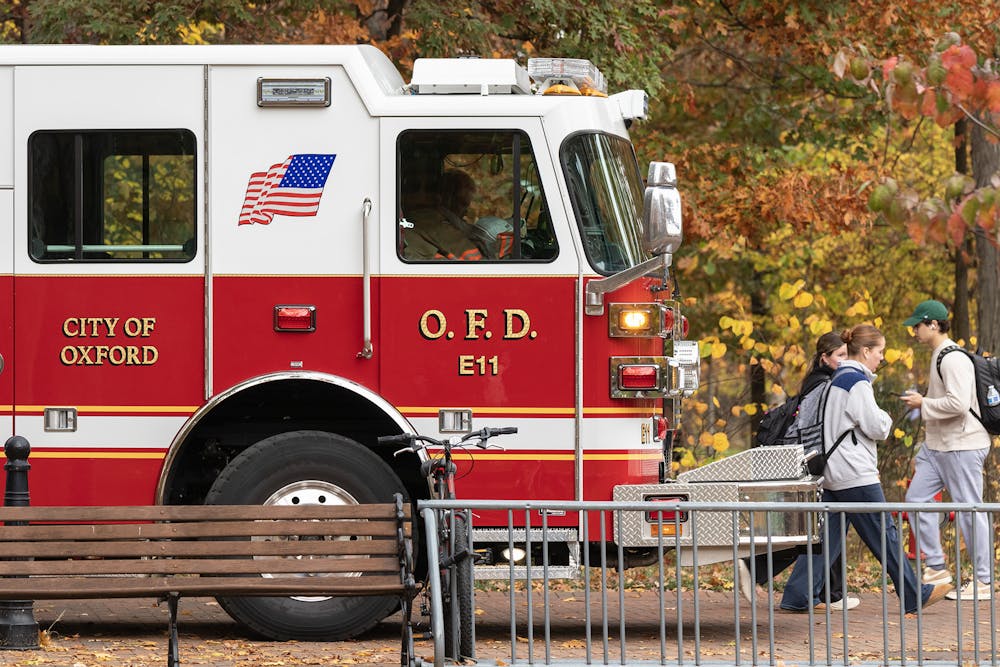After two resignations from a shift captain and a full-time firefighter/paramedic, Oxford Fire Department (OFD) is desperate for a solution to its deficit. At Tuesday’s city council meeting, fire chief John Detherage approached council members and city staff proposing three separate goals for more workers for the struggling fire and EMS staff.
Assistant city manager Jessica Greene approached the council during a work session on March 5 looking for a way to budget for new staff; however, with new resignations, a different plan is needed to keep up with the growing deficit.
OFD currently has four full-time and two part-time firefighters, which means there are six on shift with a minimum of five.
Detherage presented three proposals for more staffing to council and staff, each one more staggering than the latter. The first proposal involved getting the number of full-time firefighters up to six on shift at a given time, with two part-time firefighters accompanying them.
The second proposal involved pushing the number to nine firefighters on a shift with two part-time and seven full-time firefighters. The last proposal, favored by Detherage, pushed to have 10 firefighters on shift, with eight being full-time and two being part-time.
This last proposal would support the two primary ambulance models, where firefighters can run two separate calls at a time, while still allowing staff to get rest on a 24-hour shift.
“We’ve backed ourselves into a corner … recruiting is impossible [right now],” Detherage said.
Executing the last proposal would mean increasing the current deficit of $1.86 million to $2.3 million; however, without the added help, OFD is unable to keep up with demand.
“I think we need to go big or go home,” councilor Alex French said. “If we don’t do this now, we’re going to be facing the same problem years down the road.”
On top of new recruitment, city staff are still looking to approach Miami University and ask for a contribution. According to city manager Doug Elliott, Miami’s property was worth $254 million in 2023, which would result in a property tax of nearly $500,000. However, Miami’s property is not taxable under Ohio state law, which is why city staff must ask Miami for a contribution in lieu of taxes.
If a property tax makes it on the ballot in November, councilors anticipate that it will be a short-term levy, until they can make up the money contributed by Miami. As of right now, city staff is looking for a $600,000 contribution from Miami for on-campus students. However, city staff has yet to meet with Miami to confirm this number.
“A timed levy helps hold both [council] accountable and Miami accountable,” councilor Jason Bracken said.
Enjoy what you're reading?
Signup for our newsletter
Council then turned to the public for comment on the issue. Law director Chris Conrad and lieutenant Geoff Robinson both approached the council as residents of Oxford, urging them to act quickly and aggressively.
“I have no problem if the city approached the university for a fee,” Conrad said. “It’s a modest fee to pay to protect my daughter and her roommates.”
Robinson’s concerns fell more with the community and those who have felt the effects of an understaffed fire department.
“To hear that we are losing paramedics is very troubling,” Robinson said. “Having people there for us when we need them should be the most important thing that this council talks about. Take this seriously.”Mayor William Snavely agreed that this issue should be at the top of every agenda discussed.
“There is no issue more important on our agenda right now,” Snavely said.
Councilors continued to debate the support of voters over this issue if the levy is to hit the ballot this November. Because of the presidential election, councilors are expecting a higher turnout at the polls, potentially bringing a higher voter turnout for this levy.
“Our current system is unsustainable at a human level,” councilor David Prytherch said. “I just can’t see an option where we don’t go to voters for this. Based on previous elections, I think they’ll support it.”
Councilors were less concerned about how voters will react but more worried about how much Miami will contribute. Councilor Amber Franklin warned her fellow council members about being too confident that Miami will contribute. Other council members disagreed, putting their faith in Miami doing the “right thing” by contributing.
“I think we go forward with a good-faith assumption that Miami will contribute if we give them an amount,” Snavely said. “They have said ‘We support the [firefighters], so we are going to do something.’”
Bracken spoke of his interaction with Miami’s Associated Student Government, and the support he got from students there regarding a student fee. He said students came up to him after the meeting to show their support and see how they could help.
“[Miami] recognizes our situation and wants to be part of the solution, so until they prove me wrong I have faith in Miami,” Elliott said.
Council’s input helped city managers know what direction they will take when they meet with Miami in the next few weeks.




